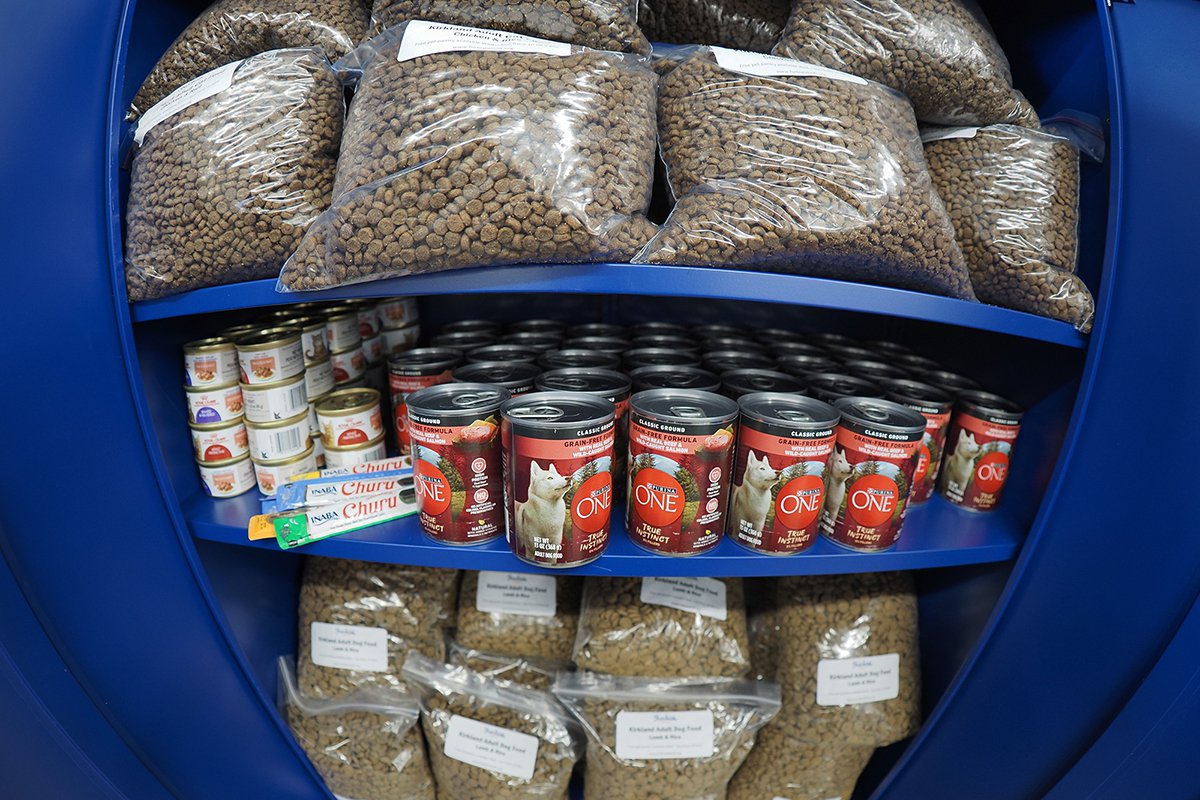William Harrison Jr. beams as he exclaims, “I feel like a kid on Christmas morning!”
Harrison, CEO of the nonprofit Furbish Thrift, is close to the source of his excitement. It’s a warm July morning at the Manchester office of the regional seniors agency, Senior Connections, and a celebratory group has gathered in the lobby to witness the opening of a closet full of pet food and supplies.
The Closet is the first satellite pet pantry established by Furbish, and it meets a largely hidden need in the community, helping older residents who love their pets but are prevented by limited income or physical disabilities from caring for their animals and sometimes themselves.
Since opening in May 2023, Furbish Thrift has grown like a wild puppy or a precocious kitten. Harrison started the retail store to generate a revenue stream that he could funnel to local animal welfare nonprofits. In its first year, the organization donated $40,000 to the animal welfare community, and in 2024, Harrison expects to donate a total of $100,000. “We’ve probably vaccinated, spayed and neutered 300 stray cats,” says Harrison, who owns three rescued dogs: dogs Lillie and Emma, and Billy, a cat. “And we had a free clinic where 90 dogs were examined and (vaccinated).”
Harrison set up Furbish’s first pet pantry outside the store last year. Soon, customers were buying an average of 50 pounds of pet food each weekday (Wednesday through Sunday); today, that number is about 100 pounds a day. Furbish has distributed more than 32,000 pounds of pet food in the past year, most of it through 12 community food pantries set up by other local nonprofits to support underserved communities, which Furbish stocks twice a month.
“We now have a space rented in the same mall (as Furbish) where we store our pet food,” says Harrison. “We buy 75-pound bags and our volunteers pack it into smaller 2- and 5-pound bags.”
The food pantry at Senior Connections was inspired by a conversation Harrison had with friends Lisa Cumbey and Kim Bolger last November. They talked about the number of pets being surrendered by older owners who could no longer afford to care for them, and the topic resonated with Bolger.
As she tells it, her parents’ standard poodle died young of cancer about 12 years ago. “One day I called them,” Bolger says, humorously imitating her thick Boston accent. “It was Mom on one extension, Dad on the other. They told me, ‘Honey, we’re too old for another dog, but we need another dog. We found one in Maine, but we can’t pick her up unless we have someone to take care of her after we leave.'”
They were both old at the time, but in excellent health. Their new dog Abby seemed to understand that she should be gentle with them. Bolger’s mother died in 2015 and her father in 2018.
“My dad got through that grief by taking care of Abby, and I got through mine by having to take care of Abby every day,” Bolger says. “And she was amazing, the most elegant dog you could imagine.”
Inspired by the conversation with Harrison and Cumbey about senior pet owners, Bolger donated $10,000 to fund the creation of the pantry at Senior Connections in honor of Abby, who died last year. Furbish will stock the large cupboard with food, litter and other pet-related supplies.
Amy Strite, executive director of Senior Connections, welcomes the contribution. The group offers its services in eight regional towns. “This is a recognition of the importance of the relationship between people and their pets and the impact it has on their lives,” she says. “It makes a difference to their health, it alleviates a sense of isolation and loneliness, and it saves them having to choose between feeding themselves and their pets.”
The Furbish food pantries have proven to be an excellent model, says Laura Cotterman, Furbish’s chief executive officer, who has 20 years of experience in nonprofit fundraising and works with numerous animal-focused nonprofits. “No application process, 24/7 access, and through partnerships, we’ve found that the pet food program literally opens doors.”
Strite explains that Senior Connections works with local hunger relief nonprofit Feed More to assess the needs of older clients, ensure they receive meals and check in on their well-being. “Some clients from marginalized communities are suspicious of agencies,” Strite says, “but helping with their pet care builds trust. You ask them about their dog, and then they tell you how they got the dog, and then you have a conversation.”
She says Senior Connections recently received a call from a child welfare agency asking for help with an elderly woman who was housebound and had taken her cat to bed with her. The problem was that the cat had fleas. “We got her some flea medication,” Strite recalls, “and that led to us asking, ‘Can we get you some food?’ And because we had helped the cat, the lady was willing to accept more help.”
And as for Bolger, she was claimed by a two-year-old bichon frise-poodle mix. “Willow – wild, wild Willow,” she says, laughing.
Never miss a Sunday Story again: Sign up for the newsletter and we’ll send you a new read to your inbox at the start of each week. To stay up to date with the latest posts, search for the hashtag #SundayStory on Facebook and Instagram.

